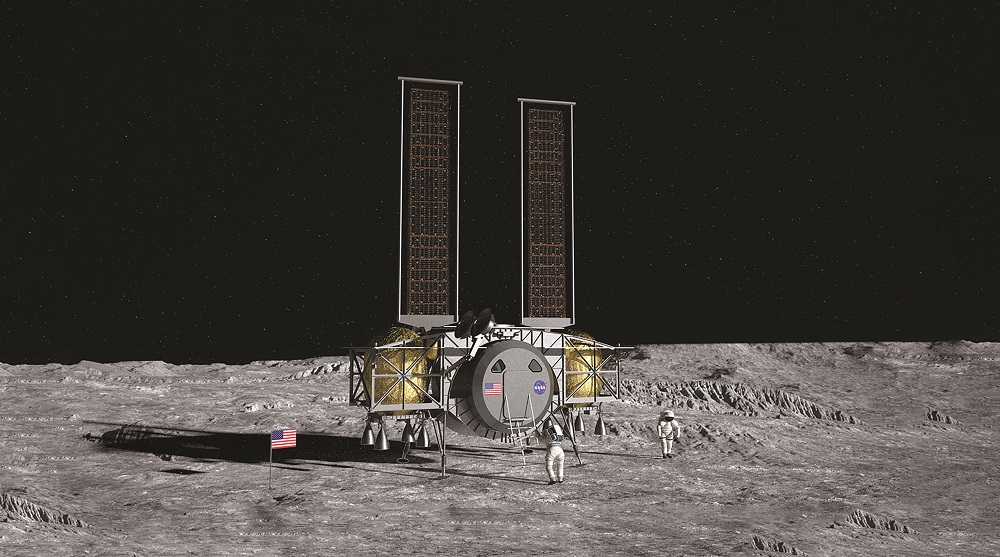WASHINGTON — NASA Administrator Bill Nelson asked Senate appropriators to provide additional funding so NASA can support a second lunar lander developer, warning that the agency needed to stay ahead of a “very aggressive” Chinese space program.
Nelson, testifying before the Senate Appropriations Committee’s commerce, justice and science subcommittee June 15 about NASA’s fiscal year 2022 budget proposal, faced criticism from senators for the agency’s decision in April to award a single contract for its Human Landing System (HLS) program to SpaceX. Officials said at the time that a funding shortfall allowed them to select only SpaceX, the lowest bidder.
“NASA’s rhetoric blaming Congress and this committee for the decision to do just one contract really rings hollow,” countered Sen. Jeanne Shaheen (D-N.H.), chair of the subcommittee. She noted NASA’s fiscal year 2021 budget proposal projected requiring $4.4 billion for HLS in 2022, while the fiscal year 2022 budget proposal released May 28 requested only $1.2 billion.
Nelson, asked about HLS later in the hearing, said NASA made the decision to select one company based on the final fiscal year 2021 appropriations bill that provided $850 million for HLS, only a quarter of NASA’s original request. Of that $850 million, $400 million was needed to support work on the three initial “base period” HLS awards made to Blue Origin, Dynetics and SpaceX.
“Before I arrived on the scene, NASA did a source selection and the board decided that they did not have enough money in what was the runout on the budget in order to have a sustained and qualified real competition,” Nelson said.
He revealed that Dynetics, the highest of the three bidders, had proposed between $8.5 billion and $9 billion, a figure that neither the company nor NASA had previously disclosed. Blue Origin, in its protest of the HLS award filed with the Government Accountability Office, said it bid $5.99 billion, while SpaceX’s winning bid was about $2.9 billion.
Nelson said he supported competition and, as he did at a House appropriations hearing May 19, suggested one way to enable competition was to add money for HLS in a jobs bill, which could also include funding for infrastructure repairs at NASA centers. Nelson said last month those two elements alone could cost more than $10 billion.
“The jobs bill is a way that you could fund NASA’s needs, not only for infrastructure, but also for this additional money to try to give us the competitive proposition so that we can downselect two landers, at least,” he said.
Nelson also brought up the threat of competition from China, similar to arguments he made at last month’s House hearing. “Be mindful of what a very aggressive space competitor is doing. I’m talking about China,” he said, mentioning their successful landing of the Zhurong rover May 14.
Nelson claimed the Chinese government officials “don’t want to wait around until the 2030s to land on the moon with humans,” mentioning a scheduled announcement of a Chinese-Russian lunar exploration road map June 16 at the Global Space Exploration Conference in St. Petersburg, Russia.
“It’s going to be important for us to be landing on the surface of the moon with the first woman and the person of color before our competitors do,” he said.
Both Shaheen and Sen. Jerry Moran (R-Kan.), ranking member of the subcommittee, pressed Nelson on a schedule for returning humans to the moon. Nelson said that while 2024 remained the goal, space programs have historically suffered delays. “We have to be soberly realistic about this, but the goal is 2024,” he told Moran.
Nelson then returned to China. “I think you’re going to see a very aggressive China,” he said. “I think that’s going to become a question for you all as policymakers. What is the value to the United States that we get back to the moon first, and get on with this program in preparation to go to Mars?”
It wasn’t immediately clear if Nelson’s arguments were persuasive to appropriators. Shaheen at one point asked if Nelson would come back to the committee to request additional funding. “No,” he responded, “because I’m requesting that right now and suggesting that a way to do that is the jobs bill.”
“Unfortunately, this committee won’t make the decision on the jobs bill,” Shaheen said, as that legislation will be done outside of the usual appropriations process.
She also appeared skeptical of the 2024 goal for a human return to the moon. “It is our goal, but space is hard,” Nelson said. “Often you get delays and you get technical things that happen that you didn’t anticipate.”
“So, I’ll take that as a maybe,” she said.
